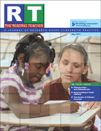
READING TEACHER
Scope & Guideline
Championing effective reading strategies for all learners.
Introduction
Aims and Scopes
- Innovative Literacy Instruction:
The journal emphasizes creative and effective methods for teaching literacy, including the use of technology, interactive read-alouds, and multimodal approaches to engage students. - Culturally Responsive Pedagogy:
A significant focus is placed on culturally sustaining practices that honor students' backgrounds and experiences, promoting equity and inclusion in literacy education. - Development of Critical Literacy Skills:
The journal advocates for teaching critical literacy, enabling students to analyze texts deeply, reflect on their meanings, and connect literature to social issues. - Research-Based Practices:
Articles often present evidence-based strategies for literacy instruction, providing teachers with practical tools to enhance student learning outcomes. - Focus on Multilingual and Biliteracy Education:
The journal explores literacy education in multilingual contexts, addressing the needs of bilingual learners and advocating for translanguaging practices.
Trending and Emerging
- Integration of Social-Emotional Learning (SEL):
Recent publications increasingly focus on integrating SEL into literacy instruction, recognizing the importance of emotional intelligence in learning and the role of literature in fostering empathy. - Technology in Literacy Education:
There is a growing trend in exploring the use of digital tools and AI in literacy education, highlighting innovative practices that enhance personalized learning experiences. - Multimodal Literacy Practices:
An emphasis on multimodal literacies is emerging, where educators explore various forms of communication and expression, including visual and digital texts, to enrich literacy learning. - Focus on Equity and Social Justice:
A strong focus on equity and social justice in literacy education is evident, with themes addressing the representation of diverse voices and perspectives in literature. - Collaborative and Community-Based Approaches:
Emerging themes highlight the importance of collaboration among educators, families, and communities in supporting literacy development, particularly in diverse and multilingual contexts.
Declining or Waning
- Traditional Phonics Instruction:
There has been a noticeable shift away from a sole focus on phonics-based instruction towards more holistic, integrated approaches to literacy that consider the sociocultural context of learning. - Standardized Assessment Practices:
The emphasis on traditional standardized reading assessments is waning, as educators increasingly seek to explore alternative assessment methods that provide a more comprehensive understanding of student literacy. - Single-Method Literacy Instruction:
The trend towards using a singular methodology for literacy instruction is declining, with more emphasis on integrated, multimodal approaches that cater to diverse learning needs. - Narrow Definitions of Literacy:
The concept of literacy is expanding beyond reading and writing to include digital literacy and critical media literacy, indicating a decline in topics focusing solely on traditional literacy.
Similar Journals

Journal of Language and Literacy Education
Elevating Educational Practices Through Rigorous ResearchThe Journal of Language and Literacy Education, published by the University of Georgia, College of Education, is an essential resource for researchers, educators, and students engaged in the dynamic field of language and literacy. With an ISSN of 1559-9035 and a commitment to open discussions on contemporary educational practices, this journal aims to bridge the gap between theory and practice, fostering innovative pedagogical approaches that resonate with diverse learning communities. Operating from 427 Tucker Hall, Athens, GA 30602, the journal holds a notable position in the Social Sciences - Education category, ranked at #854 out of 1543 in Scopus, with a 44th percentile standing. Spanning a converged period from 2020 to 2024, it offers a platform for cutting-edge research, critical reviews, and discourse surrounding language acquisition, literacy development, and educational strategies. Engaging with this journal not only enriches academic pursuits but also elevates professional practices within the field.
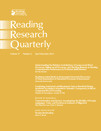
READING RESEARCH QUARTERLY
Elevating understanding of literacy development globally.READING RESEARCH QUARTERLY is a premier academic journal dedicated to advancing the understanding of reading research within the domains of educational psychology and literacy development. Published by Wiley, this journal has been a vital resource for researchers, educators, and practitioners, featuring empirical studies, theoretical papers, and comprehensive reviews since its inception. With a remarkable impact factor and consistently ranked in the Q1 quartile for both Developmental and Educational Psychology and Education, it stands out as an authoritative source in the field. Notably, it possesses a strong international presence, evidenced by its Scopus rankings, sitting in the top 3% for educational social sciences and within the top 5% for developmental psychology. Although currently not offering Open Access, the journal ensures that its contributions are accessible through institutional subscriptions. By linking theoretical frameworks with practical applications, READING RESEARCH QUARTERLY serves as an essential platform for fostering innovation and collaboration among scholars and practitioners aiming to enhance literacy education and understanding.
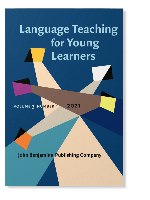
Language Teaching for Young Learners
Empowering educators to inspire young language learners.Language Teaching for Young Learners, published by John Benjamins Publishing Co, is a premier journal dedicated to enhancing the pedagogy of language acquisition in early childhood education. Since its inception in 2019, it has rapidly established itself within the research community, reflected by its high Scopus rankings—placing it in the 85th percentile for Language and Linguistics and the 84th percentile for Education. The journal aims to provide a platform for innovative research, practical insights, and theoretical discussions surrounding the teaching of languages to young learners, thus contributing significantly to the fields of Education and Linguistics. With an open access model currently unavailable, it caters to a diverse global audience, including researchers, educators, and policy-makers, keen on improving pedagogical practices. Located in the Netherlands, the journal's commitment to academic excellence is evident through its Q1 and Q2 rankings in Linguistics and Language and Education respectively, encouraging continual discourse in cultivating effective language education practices.
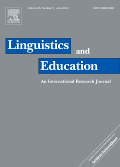
Linguistics and Education
Shaping Educational Policy with Linguistic ExpertiseLinguistics and Education, published by Elsevier, is a premier journal dedicated to advancing the understanding of the intersections between linguistics and educational practices. With its ISSN 0898-5898 and E-ISSN 1873-1864, this journal has established itself as a significant platform since its inception in 1988, continuing to produce impactful research up to 2024. It enjoys a prestigious Q1 ranking in both the Education and Linguistics and Language categories, reflecting its high-quality contributions and leading role in the field. The journal’s Scopus rankings further underscore its influence, being placed in the 87th percentile for Arts and Humanities in Language and Linguistics, and the 86th percentile in Social Sciences in Linguistics and Language. Although it operates under traditional subscription access, its contributions are essential for researchers, professionals, and students alike, making substantial strides in the understanding of language, learning environments, and pedagogical strategies. The journal's objective is to foster interdisciplinary dialogue and disseminate innovative research that informs educational policy and practice.
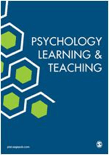
Psychology Learning and Teaching-PLAT
Unlocking potential through research-driven teaching methodologies.Psychology Learning and Teaching (PLAT) is a distinguished academic journal published by SAGE Publications Ltd, dedicated to advancing the field of educational psychology. With an ISSN of 1475-7257 and an E-ISSN of 2057-3022, this journal serves as a vital resource for researchers, educators, and practitioners seeking to explore innovative teaching methodologies and learning strategies within the context of psychology. As of 2023, its reputation is underscored by its Q1 ranking in Education and Q2 ranking in Psychology (miscellaneous), reflecting its significant contributions to the scholarly community. Placing an emphasis on empirical research and practical application, PLAT publishes research that not only enhances educational practices but also addresses contemporary psychological issues. Open access options facilitate widespread dissemination of knowledge, while its robust impact factor highlights its influence within the educational and psychological discourse. This journal is essential for anyone committed to the intersection of psychology and education, providing thought-provoking insights that inspire ongoing dialogue and development in the field.
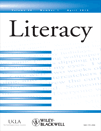
Literacy
Advancing the Dialogue on Literacy EducationLiteracy is a premier academic journal published by Wiley, focusing on critical advancements and research in the fields of education and linguistics. With an impressive impact factor reflected in its Q2 ranking in Education and Q1 in Linguistics and Language, this journal serves as a vital platform for researchers, educators, and students seeking to explore contemporary issues surrounding literacy in diverse contexts. Since its inception in 2005, Literacy has made significant contributions to understanding the evolving nature of literacy practices, promoting dialogue on innovative pedagogies and the sociocultural implications of language use. While it is not an Open Access journal, its accessibility through institutional subscriptions ensures that its valuable insights reach a broad audience. With its robust Scopus rankings, including an 88th percentile in Language and Linguistics and 63rd in Education, Literacy remains an indispensable resource for those committed to advancing literacy education and research.

RESEARCH IN THE TEACHING OF ENGLISH
Empowering Educators with Groundbreaking ResearchResearch in the Teaching of English is a premier academic journal published by the National Council of Teachers of English, dedicated to advancing the methodologies and practices in the field of English language education. With a robust ISSN of 0034-527X and e-ISSN of 1943-2348, the journal has carved a niche for itself by consistently presenting cutting-edge research that informs and enhances teaching efficacy in diverse educational contexts. Spanning publication periods from 1996 to 2001 and from 2004 to 2024, it serves as a pivotal resource for educators and researchers. Recognized for its impact, the journal currently holds a Q2 classification in Education and a Q1 in Linguistics and Language, reflecting its significance in academic discourse. With commendable Scopus rankings within the top percentiles in both Arts and Humanities and Social Sciences, it remains an essential platform for scholarly discussion aimed at improving English language teaching methodologies. Join a community of professionals devoted to enriching language education through innovative research contributions.

Language and Literacy
Catalyzing Collaboration Among Language and Literacy ExpertsLanguage and Literacy is an esteemed journal published by LANGUAGE & LITERACY RESEARCHERS CANADA, focusing on the vital intersections of language acquisition and literacy development. With a commitment to open access since 1999, this journal provides a platform for researchers and practitioners to share innovative findings and pedagogical insights that enhance the understanding of language and literacy in various educational contexts. The journal aims to foster a dialogue among educators, researchers, and policy makers by disseminating high-quality research and facilitating discussions on best practices. Recognized for its contributions to the field, Language and Literacy serves as an indispensable resource for those dedicated to improving literacy outcomes and language education globally. Based in Victoria, BC, Canada, it invites submissions that explore theoretical frameworks, empirical studies, and applied research, thereby enriching the academic community’s knowledge base.

TESL Canada Journal
Elevating ESL Pedagogy with Groundbreaking ResearchTESL Canada Journal, published by TESL Canada, serves as a vital resource for researchers, educators, and practitioners in the field of English as a Second Language (ESL) and applied linguistics. With its commitment to advancing scholarship and best practices in language education, this esteemed journal fosters a platform for the dissemination of high-quality research and innovative pedagogical approaches. Although it operates without open access, its comprehensive articles and reviews offer valuable insights into current trends and challenges faced by ESL educators across Canada and internationally. The journal is dedicated to promoting a deeper understanding of language acquisition processes and instructional methodologies, contributing significantly to the professional development of its readership. Located in Burnaby, Canada, the journal aims to bridge the gap between theory and practice, making it an indispensable source for educators and researchers looking to enhance their expertise in ESL education.
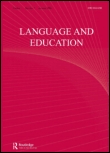
Language and Education
Advancing Scholarship at the Intersection of Language and EducationLanguage and Education is a leading academic journal published by Routledge Journals, Taylor & Francis Ltd, specializing in the intersection of language studies and educational practices. With an impressive Q1 ranking in both Education and Linguistics and Language categories for 2023, it stands out as a crucial resource for researchers, educators, and industry professionals. Covering a wide array of topics pertinent to language acquisition, pedagogical methodologies, and culturally responsive education, this journal supports rigorous scholarship in the field. While not currently offering open access options, its contributions are vital for advancing knowledge and fostering innovation across disciplines. The journal's long-term commitment to excellence is evidenced by its high rankings in Scopus, placing it in the 94th percentile in Language and Linguistics and the 80th percentile in Education. Since its inception in 1987, Language and Education has not only tracked the evolving landscape of language education but has also actively shaped it, making it an indispensable tool for anyone invested in educational research and practice.